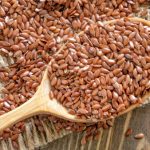A healthy gut consists of essential fatty acids which can be provided by the Mediterranean diet.
The Mediterranean diet has gained popularity for its health benefits. It consists of plenty of fruits and vegetables, nuts, legumes and seeds.
Furthermore, it requires eating more fish, moderating alcohol consumption and including healthy fats as opposed to trans or saturated fats.
 New research has given us another reason to enjoy more dietary fiber – it is linked with the promotion of short chain fatty acids.
New research has given us another reason to enjoy more dietary fiber – it is linked with the promotion of short chain fatty acids.
Short chain fatty acids are produced in the gut through fermentation of plant-based insoluble fiber. Short chain fatty acids have been linked with improved health outcomes, such as reducing inflammation, diabetes and cardiovascular disease.
The diets from 153 adults were recorded over the course of a week. Participants were omnivores, vegetarians or vegan. Their levels of gut bacteria was measured through stool and urine samples. The majority of those in the study closely followed the Mediterranean diet.
Vegans and vegetarians had the highest levels of short chain fatty acids when they followed the Mediterranean diet as closely as possible. High levels of short chain fatty acids were also seen in fruit and vegetable consumption.
Furthermore, a compound linked with cardiovascular disease was also lower in the vegetarians and vegans compared with the omnivores. But if an omnivore followed closely to the Mediterranean diet then they had lower levels of the compound as well.
The researchers concluded, “We provide here tangible evidence of the impact of a healthy diet and a Mediterranean dietary pattern on gut microbiota and on the beneficial regulation of microbial metabolism towards health maintenance in the host. Western omnivore diets are not necessarily detrimental when a certain consumption level of [plant] foods is included.”
The findings were published in Gut.
Short chain fatty acid (SCFA) food sources
 If you want to promote a healthy gut, be sure to eat short chain fatty acid foods. But don’t think you have to go vegan or vegetarian – you just need to add more fruits and vegetables. Add the foods listed below into your diet to start feeling better.
If you want to promote a healthy gut, be sure to eat short chain fatty acid foods. But don’t think you have to go vegan or vegetarian – you just need to add more fruits and vegetables. Add the foods listed below into your diet to start feeling better.- Resistant starches: whole-grains, barley, brown rice, beans
- Pectin: apples, apricots, blackberries, carrots, oranges
- Fructooligosaccharides (FOS) and inulin: onions, artichokes, leeks, wheat, rye, asparagus
- Arabinoxylan: wheat bran
- Guar gum: food additive in dressings, ice cream, frozen meat
Learn more about the Mediterranean diet
 The Mediterranean diet continues to be hailed for its health benefits. Numerous research studies have linked it with improved cognitive and heart function. Other health benefits include protection against type 2 diabetes, stroke prevention and increased longevity.
The Mediterranean diet continues to be hailed for its health benefits. Numerous research studies have linked it with improved cognitive and heart function. Other health benefits include protection against type 2 diabetes, stroke prevention and increased longevity.
The Mediterranean diet consists of the following foods:
Meat: enjoyed in the very small amounts
Sweets: enjoyed in small amounts and in moderation (if eliminated you can experience more health benefits)
Poultry, eggs, cheese and yogurt: in moderation and enjoyed either daily to weekly
Fish and seafood: eaten at least twice a week
Fruits, vegetables, olives, grains, beans, seeds, olive oil, herbs and spices: enjoyed every day
For the best results, it’s also important to exercise and stay social while eating the Mediterranean way.
The Mediterranean diet does not permit the consumption of fast-food, processed food or anything that is fried; for those reasons you can see why it can lead to health benefits. Additionally, it is important to enjoy three meals a day – no skipping meals with this style of eating.
Essentially, the Mediterranean diet consists of eating fresh, whole foods. It still allows for meat, so you won’t be completely vegetarian or vegan. The take away from it is the consumption of fruits and vegetables should be of high priority, as they provide the most benefits based on their nutrients.
Other useful fatty acids
Aside from short chain fatty acids, there are additional fatty acids which we should be consuming for good health. Better yet, the Mediterranean diet can easily provide them for us.
Both omega-3 and omega-6 are additional fatty acids that are essential for overall good health. Sources of omega-3 fatty acids include:
- Cold water fatty fish – salmon, anchovies, mackerel
- Flaxseed oil
- Avocado
- Dark leafy greens – kale, spinach, purslane, mustard greens
Sources of omega-6 are:
By eating foods which are sources of omega-3 and omega-6 you can have improved health overall.
References:
http://www.nutrientsreview.com/lipids/short-chain-fatty-acids
http://www.belmarrahealth.com/mediterranean-diet-health-benefits
https://umm.edu/health/medical/altmed/supplement/omega3-fatty-acids
https://umm.edu/health/medical/altmed/supplement/omega6-fatty-acids
http://www.dailyperricone.com/2008/12/best-food-choices-for-omega-3-and-omega-6-and-omega-9-essential-fatty-acids
http://www.nutrientsreview.com/lipids/short-chain-fatty-acids
http://www.belmarrahealth.com/mediterranean-diet-health-benefits
https://umm.edu/health/medical/altmed/supplement/omega3-fatty-acids
https://umm.edu/health/medical/altmed/supplement/omega6-fatty-acids
http://www.dailyperricone.com/2008/12/best-food-choices-for-omega-3-and-omega-6-and-omega-9-essential-fatty-acids

No comments:
Post a Comment